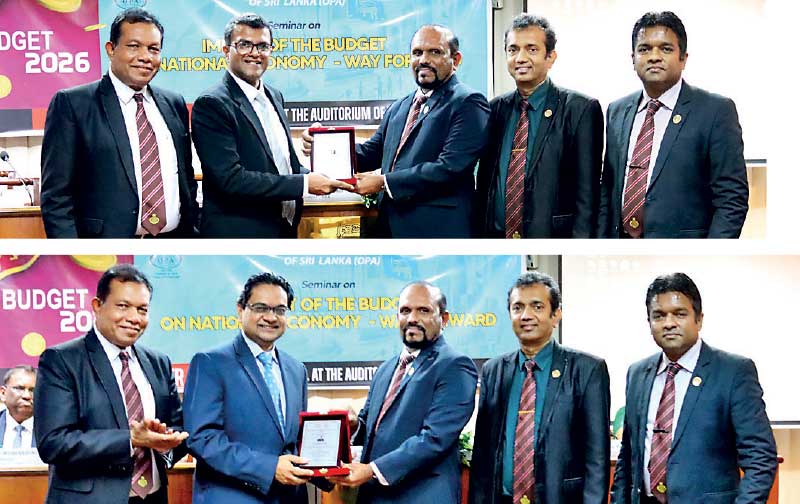Sunday Jan 11, 2026
Sunday Jan 11, 2026
Monday, 24 November 2025 04:54 - - {{hitsCtrl.values.hits}}


The 2026 National Budget focuses on growth while advancing development and debt sustainability. This was highlighted at a seminar on “Impact of the Budget on the National Economy –Way Forward” organised by the Organisation of Professional Associations of Sri Lanka. The Keynote Speaker was Secretary to the Treasury and Secretary to the Ministry of Finance Dr. Harshana Suriyapperuma, while the panel of expert guest speakers consisted of former Central Bank of Sri Lanka Deputy Governor J.P.R. Karunaratne, Department of Inland Revenue Commissioner of Tax Policy and Legislation S. Iyesha Asanthi, and Verité Research Director Dr. Nishan De Mel.
Vice President Mr. Bhanu Wijayaratne stated that the seminar would focus on the budget’s impact on the national economy. Highlighting several key features of the budget, he observed that it contained ambitious targets, and the seminar explored how these objectives can be achieved.
Delivering the keynote address, Dr. Harshana Suriyapperuma observed that Sri Lanka was successfully navigating a challenging period due to the collective efforts of all stakeholders, particularly its citizens and the business community. He stressed that the central objective of the 2026 Budget was to drive growth by focusing on short- and medium-term policies while framing the foundation for future growth. The Budget, he noted, promotes several key strategies, including expert diversification, inclusive growth, debt sustainability, strengthening the production economy, eradicating rural poverty and promoting digitisation. Furthermore, it aims to strengthen the confidence built by the government by ensuring greater consistency in taxation and debt sustainability, enhancing stakeholder consultation, and improving the business environment through trade agreements.
Dr. Suriyapperuma also addressed the widespread misconception that debt repayment would commence only in 2028, clarifying that repayments are already being made on schedule. Since the increase in repayment obligations in 2028 will be marginal, he expressed confidence in Sri Lanka’s ability to meet its commitments—provided the country maintains its trajectory of higher fiscal revenue and disciplined expenditure. He stressed the need for zero tolerance for corruption, comprehensive digitisation, greater transparency and accountability, and focused development of the education, transport and SME sectors.
Dr. Nishan de Mel noted that the country’s fiscal indicators were very positive, with controlled expenditure, stable revenue growth, budget deficit reduction and impressive primary balance. However, he warned that real indicators were troubling, as employment is at a 20-year low, real incomes remain below 2018 levels, and poverty has doubled since 2019. He also pointed to weaknesses in monetary policy, including missed inflation targets for six consecutive quarters, the highest real interest rates in decades, and the world’s highest interest-cost-to-revenue ratio. The build-up of foreign reserves has also stalled. As a result, he argued that monetary shortcomings were eroding fiscal gains.
In assessing the Budget, Dr. de Mel highlighted several positives: revenue exceeded targets in 2024 and 2025, with VAT contributing a 2.8% increase this year, and health spending surpassed defence allocations in 2025 for the first time in decades. He also noted the Budget’s focus on social welfare and infrastructure. However, he raised concerns that over the lack of cost estimates for several proposals, unexplained increases in major allocations, inconsistencies in data, and decrease in publicly available information on GDP, poverty and other indicators.
In the Q&A session that followed and moderated by Vice President Bhanu Wijayaratne, S. Iyesha Asanthi stated that several measures had been introduced to broaden the tax net, including the reduction of the tax threshold, introduction of e-invoicing system as well as a modern tax audit scheme. J.P.R. Karunaratne observed that the Government was currently on a clear path towards debt repayment under the IMF program. He expressed confidence in Sri Lanka’s ability to meet foreign debt repayments following the build-up of foreign reserves. However, he cautioned against taking on additional foreign debt, especially for unproductive purposes, and stressed the need to boost exports to cushion against external vulnerabilities.
Dr. Suriyapperuma noted that the Government sought to increase foreign direct investment by promoting stability and boosting efficiency, including a single window for trade facilitation, which would encourage potential investors. He further observed that government borrowing had reduced due to prudent treasury management. While stating that there was room for further private sector credit, Dr. De Mel proposed the establishment of a bad bank, which would absorb all non-performing assets and initiate a recovery process. He also highlighted the need to boost exports by looking beyond trade facilitation and focusing on new growth areas, product diversification and new markets.
The seminar was attended by OPA President Jayantha Gallehewa, President-Elect Tisara de Silva, General Secretary Ravi Rupasinghe, Treasurer Dharshana Wijemanne, along with other officer bearers and delegates from OPA’s professional membership.